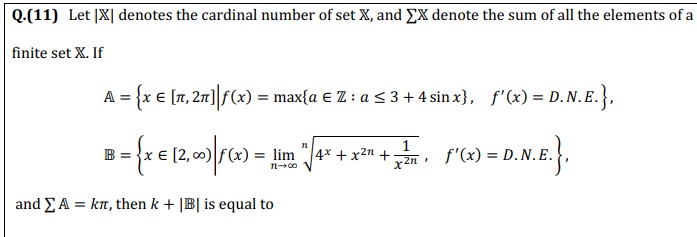Question
Question: Let $|X|$ denotes the cardinal number of set $X$, and $\sum X$ denote the sum of all the elements of...
Let ∣X∣ denotes the cardinal number of set X, and ∑X denote the sum of all the elements of a finite set X. If
A={x∈[π,2π]∣f(x)=max{a∈Z:a≤3+4sinx},f′(x)=D.N.E.},
B={x∈[2,∞)∣f(x)=limn→∞n4x+x2n+x2n1,f′(x)=D.N.E.},
and ∑A=kπ, then k+∣B∣ is equal to

13.5
Solution
The problem asks for the value of k+∣B∣, where k is related to the sum of elements in set A, and ∣B∣ is the cardinal number of set B.
First, let's analyze set A: A={x∈[π,2π]∣f(x)=max{a∈Z:a≤3+4sinx},f′(x)=D.N.E.}
The function f(x) is given by f(x)=⌊3+4sinx⌋. The derivative f′(x) does not exist when the argument of the greatest integer function, 3+4sinx, is an integer.
Let 3+4sinx=m, where m∈Z. This implies sinx=4m−3.
Since −1≤sinx≤1, we have −1≤4m−3≤1, which simplifies to −4≤m−3≤4, or −1≤m≤7.
So, m can be any integer from -1 to 7. The possible values of sinx are 4−1,40,41,42,43,44,45,46,47. Wait, the denominator is 4, so the possible values are 4−1−3=−1,40−3=−3/4,41−3=−1/2,42−3=−1/4,43−3=0,44−3=1/4,45−3=1/2,46−3=3/4,47−3=1.
We need to find the values of x∈[π,2π] such that sinx takes these values. In the interval [π,2π], sinx≤0. So we consider sinx∈{−1,−3/4,−1/2,−1/4,0}.
- sinx=−1: x=23π in [π,2π].
- sinx=−3/4: Let α=arcsin(3/4), where α∈(0,π/2). The values of x in [π,2π] are π+α and 2π−α. So x=π+arcsin(3/4) and x=2π−arcsin(3/4).
- sinx=−1/2: The values of x in [π,2π] are π+6π=67π and 2π−6π=611π.
- sinx=−1/4: Let β=arcsin(1/4), where β∈(0,π/2). The values of x in [π,2π] are π+β and 2π−β. So x=π+arcsin(1/4) and x=2π−arcsin(1/4).
- sinx=0: The values of x in [π,2π] are π and 2π.
The set A consists of all these distinct values: A={23π,π+arcsin(43),2π−arcsin(43),67π,611π,π+arcsin(41),2π−arcsin(41),π,2π}. All these 9 values are distinct and lie within the interval [π,2π].
The sum of elements in A, ∑A: ∑A=23π+(π+arcsin(43))+(2π−arcsin(43))+67π+611π+(π+arcsin(41))+(2π−arcsin(41))+π+2π. Using the property (π+θ)+(2π−θ)=3π: (π+arcsin(3/4))+(2π−arcsin(3/4))=3π. (π+arcsin(1/4))+(2π−arcsin(1/4))=3π. ∑A=23π+3π+67π+611π+3π+π+2π. ∑A=23π+3π+618π+3π+π+2π. ∑A=23π+3π+3π+3π+π+2π. ∑A=23π+12π=23π+24π=227π. We are given ∑A=kπ, so kπ=227π, which gives k=227.
Next, let's analyze set B: B={x∈[2,∞)∣f(x)=limn→∞n4x+x2n+x2n1,f′(x)=D.N.E.} Let g(x)=limn→∞n4x+x2n+x2n1. For x∈[2,∞), we have x≥2, so x2≥4. As n→∞, x2n=(x2)n grows much faster than 4x and x−2n=(x−2)n=(1/x2)n. We can write g(x)=limn→∞nx2n(x2n4x+1+x4n1)=limn→∞x2nx2n4x+1+x4n1. For x≥2, x2n4x=(x2)n(4x/n)n→0 as n→∞ since x2≥4 and 4x/n→1. Also, x4n1→0 as n→∞ for x≥2. So, g(x)=x2limn→∞n0+1+0=x2⋅1=x2. Thus, f(x)=x2 for x∈[2,∞). The derivative of f(x)=x2 is f′(x)=2x. The derivative f′(x)=2x exists for all x∈[2,∞). The set B contains values of x∈[2,∞) where f′(x) does not exist. Since f′(x) exists for all x∈[2,∞), there are no such values of x. Therefore, set B is the empty set, B=∅. The cardinal number of set B is ∣B∣=0.
We need to find k+∣B∣. k+∣B∣=227+0=227.
The final answer is 227.
